|
|
|
Sort Order |
|
|
|
Items / Page
|
|
|
|
|
|
|
| Srl | Item |
| 1 |
ID:
025385
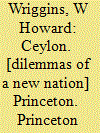

|
|
|
|
|
| Publication |
Princeton, Princeton University Press, 1960.
|
| Description |
xiii, 505p.hbk
|
|
|
|
|
|
|
|
|
|
|
|
Copies: C:1/I:1,R:0,Q:0
Circulation
| Accession# | Call# | Current Location | Status | Policy | Location | IssuedTo | DueOn |
| 021340 | 954.93/WRI 021340 | Main | Issued | General | | RF167 | 18-Apr-2024 |
|
|
|
|
| 2 |
ID:
164909
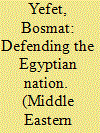

|
|
|
|
|
| Summary/Abstract |
This article discusses the Muslim discourse concerning the Coptic Christian minority since the 2000s in Egypt. Emphasizing the effects of the January 2011 uprising, the paper analyzes the role of nationalism and the national unity discourse in suppressing the debate regarding discrimination against the Copts. Despite the fissures that were created in the discourse, which rejects any reference to discrimination against the Copts, the Coptic issue remains trapped among the contested interpretations of national unity. All narratives of national unity and Egyptian essence, whether the official one pursued by the regime or the one promoted by pro-democracy activists, require the Copts to suppress their demand for rights for the sake of national unity. Adherence to the national unity discourse by all forces precludes the possibility of developing a form of nationalism or a national culture which embodies pluralism of identities and cultures and reinforces the role of nationalism as a tool for stifling pluralism and democracy for all Egyptians, whether Muslim majority or minorities.
|
|
|
|
|
|
|
|
|
|
|
|
|
|
|
|
| 3 |
ID:
086758
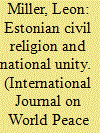

|
|
|
|
|
| Publication |
2009.
|
| Summary/Abstract |
After the collapse of Soviet Union, Estonia took pride in becoming a model of progressive social, economic and political reform. Its accomplishments have been commendable given the fact of its enormous diversity challenge. This diversity challenge (that Estonia must effectively manage as a part of its adjustment to democracy) is largely due to massive population shifts that were a part of Soviet strategy.
|
|
|
|
|
|
|
|
|
|
|
|
|
|
|
|
| 4 |
ID:
133096
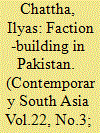

|
|
|
|
|
| Publication |
2014.
|
| Summary/Abstract |
This essay provides new evidence on local Pakistani politics in the immediate post-independence period. It reveals that far from being a period of national unity and service to the fledgling state, the country was mired in faction-building strategies between political rivals, competing for power and scrambling for resources, with debilitating consequences for democratic consolidation. While the new sources - largely based upon the archival records deposited at the National Documentation Centre, Islamabad - provide material relating primarily to Punjab, this essay demonstrates that the tensions between central government and the provinces can only be comprehended by reference to studies of localities.
|
|
|
|
|
|
|
|
|
|
|
|
|
|
|
|
| 5 |
ID:
140660
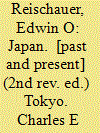

|
|
|
|
|
| Edition |
2nd rev. ed.
|
| Publication |
Tokyo, Charles E Tuttle Company, 1954.
|
| Description |
xi + xi, 292p.pbk
|
|
|
|
|
|
|
|
|
|
|
|
Copies: C:1/I:0,R:0,Q:0
Circulation
| Accession# | Call# | Current Location | Status | Policy | Location |
| 012065 | 952/REI 012065 | Main | On Shelf | General | |
|
|
|
|
| 6 |
ID:
087660
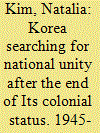

|
|
|
|
|
| Publication |
2009.
|
| Summary/Abstract |
The rout of Japan and the liberation of Korea by the Allied Forces, which ended in the unconditional surrender of the Japanese army on August 15, 1945, opened a new epoch in the political history of Korea. The long-awaited collapse of the Japanese colonial power was received by the Korean public as the beginning of a new stage in the country's history1 and an opportunity to create a new independent society on the basis of an anti-imperialist, anti-feudal foundation.2 Thus, the national task as it was understood by the public forces did not fully correspond to the drafts of the solution of the Korean problem on the principle of international trusteeship as suggested at international conferences at the time of World War II. It was only the political situation that could change the position of the leaders of the nationalist and left-wing movements on the question of ending colonization and creating a genuinely independent Korean nation.
Prior to 1948, the Korean nationalists and representatives of left-wing organizations believed that Korea's future could and should be determined by the joint efforts of the political parties of Korea themselves, but not by international conferences and their participants. But there were too many obstacles in the way of the implementation of that strategy, the main ones being the presence of foreign troops on Korean territory.
The liberation of Korea was not a result of the straggle of the Koreans against the Japanese militarists. It was achieved with the help of outside forces which in turn, began to claim administrative power in the occupied zone. The Koreans found themselves in the position of outsiders in deciding the question of power and its legal existence.
Another, no less important, obstacle was the absence of political unity among
|
|
|
|
|
|
|
|
|
|
|
|
|
|
|
|
| 7 |
ID:
160077
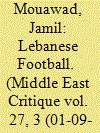

|
|
|
|
|
| Summary/Abstract |
The growing literature on sports in Lebanon tends to portray football as often implicated in the production of sectarian belonging and national disintegration. This article lays out key features of the complex politicization of sports in Lebanon vis-à-vis the discourse of national unity. It shows how the ruling elite uses sports to reaffirm its position as custodian of the hegemonic discourse of national unity that revolves around religious communities living together. It further demonstrates how normal citizens through everyday practices, and when not under the dominion of the elites, tend to ‘imagine from below’ a country that is not only powerful and defiant but also able to compete with the very countries that reputedly interfere in its domestic politics.
|
|
|
|
|
|
|
|
|
|
|
|
|
|
|
|
| 8 |
ID:
111862
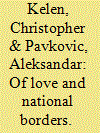

|
|
|
|
|
| Publication |
2012.
|
| Summary/Abstract |
Croatia became a UN member only in 1992, after the violent break-up of Yugoslavia. Its anthem is marked by historically founded ambivalences as to the nature and territorial extent of the nation in question. This article offers an interpretation of the current version of the anthem and an analysis of the narrative and imagery of the nineteenth-century poem from which the anthem originates. Three of the anthem's four stanzas speak about the Croats' love for their homeland and their people and of the steadfastness and immortality of their love; the remaining stanza extolls the beauty of the homeland. By addressing the homeland's rivers and the sea directly, its singers appropriate this geography and so demarcate the borders of their much-loved homeland. The anthem thus asserts Croatia's unity (against potential pretenders) and its unbreakable ties with its people. In contrast, the original fourteen-stanza poem 'The Croatian Homeland', written in 1835, is a paean to the Croats' ties to nature, their simple life and bravery - the romantic virtues of pure national souls. On their path to anthemhood, the four stanzas drawn from this poem have undergone significant modifications and additions, the result being a song that is doubly reassuring: it reassures the singers first of the people's love for themselves as a people, and second that this love is the means by which the 'natural' territory of the homeland is maintained.
|
|
|
|
|
|
|
|
|
|
|
|
|
|
|
|
| 9 |
ID:
160856
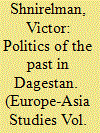

|
|
|
|
|
| Summary/Abstract |
Dagestan is inhabited by numerous ethnic communities with their own languages, cultures and histories. However, despite its ethnic and cultural diversity, the republic’s authorities have consistently sought to promote a unified concept of Dagestani identity. This policy has been challenged by local ethnic nationalists concerned about the future of their ethnic communities, which they saw as being endangered by assimilation and marginalisation. This struggle to secure political and social benefits began in the Soviet period and reached its height in the early 1990s. Resentment was particularly widespread among the Kumyks and Lezgins. Their dissatisfaction with the status quo resulted in a competition between inclusive (national) and exclusive (ethnic) approaches, which in turn manifested themselves in debates over historiography. This essay analyses the development and outcomes of this struggle from the 1950s through to the early 2000s, with an emphasis on the early 1990s.
|
|
|
|
|
|
|
|
|
|
|
|
|
|
|
|
| 10 |
ID:
086757
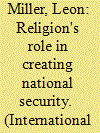

|
|
|
|
|
| Publication |
2009.
|
| Summary/Abstract |
Leon Miller begins to address the thorny issue of how to create a political culture acceptable to all citizens in the absence of a dominant power. Can a "civil religion" be developed "from below" that will provide enough cultural cohesion for a democratic state in which there is cultural diversity? He writes from the perspective of Estonia where, after the collapse of the Soviet Union, there are about 60 percent Estonians and 40 percent Russians and foreign nationals. How can such a country create unified national symbols? Since the time of Rousseau the idea of a civil religion, as opposed to an official state religion like Catholicism, has been widely discussed. However, civil religion has to be a less comprehensive and more open-ended set of beliefs, and must rely on "truths" that appear much more "self-evident" than many religious and ideological doctrines. In a sense, Marxism was a failed attempt to create a "scientific" civil religion. However, it became closed and stagnant when allied to the power of the state. Can any civil religion transcend these problems?
|
|
|
|
|
|
|
|
|
|
|
|
|
|
|
|
| 11 |
ID:
134206
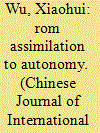

|
|
|
|
|
| Publication |
2014.
|
| Summary/Abstract |
This article examines regional autonomy in China's ethnic minority areas and its implications for minority rights in China. It argues that China's regional autonomy regime is in need of improvement in quest for national unity, social harmony and equality among ethnic groups in China. In light of past State-minority relations, as well as changing conditions in China, and by reference to international experience, the article offers suggestions for China to improve and implement minority rights legislation and policies. It argues that, under the existing political system in view of the existing basic framework on minorities, the Chinese State should adopt a new approach which encompasses elements of rule of law, deliberative democracy and international human rights standards. The new approach should guarantee respect for minority identities and seek means of establishing their respective autonomies and realizing their special rights. It should focus as much on the process as on the decisions, on the voices as on the results and on the individuals as on the groups. In this way, China's national regional autonomy would be oriented towards a complete policy of commitment to pluralistic values within the Chinese polity and would be more likely to satisfy the minority aspirations and the State's need for national stability and unity.
|
|
|
|
|
|
|
|
|
|
|
|
|
|
|
|
| 12 |
ID:
133125
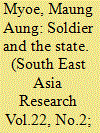

|
|
|
|
|
| Publication |
2014.
|
| Summary/Abstract |
The government of Myanmar is today publicly committed to building a 'modern developed democratic nation'. It has initiated a number of measures aimed at political and economic liberalization. This article examines the military's perception of the ongoing process of liberalization. It argues that, on the basis of mutual understanding and smooth relations between the government and the military at both individual and institutional levels, the military is likely to continue its support for the political liberalization measures initiated by the President and supported by the National Assembly. However, the military is not yet prepared to tolerate any structural changes that would undermine its national political role, the basic principles it has laid down for national unity, or its institutional autonomy.
|
|
|
|
|
|
|
|
|
|
|
|
|
|
|
|
| 13 |
ID:
190825
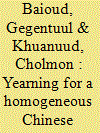

|
|
|
|
|
| Summary/Abstract |
This study examines the digital propaganda campaigns carried out by the Chinese Communist Party in Inner Mongolia following Mongols’ protest against the bilingual education reform in 2020. It analyses texts and images posted on WeChat official accounts of the Inner Mongolia Daily and Inner Mongolia Education Department. Through a detailed discourse and semiotic analyses of propaganda texts we reveal that the national unity and development discourses are replete with Han-centric assimilationist ideology. In our analysis, by drawing on a Bakhtinian chronotope, we foreground how the past, present and future are turned into a unified folkloric-cum-colonial space–time. This study also elucidates how the drastic policy shift and the re-articulation of national form in China is reflected in publicly circulated words and images in Inner Mongolia.
|
|
|
|
|
|
|
|
|
|
|
|
|
|
|
|
|
|
|
|
|